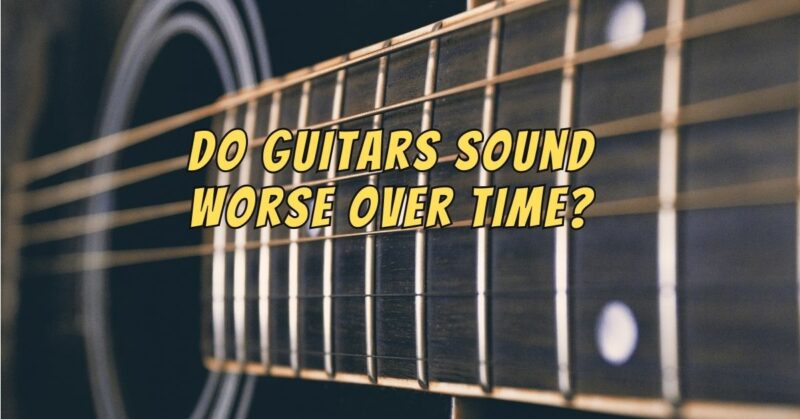Guitars do not inherently sound worse over time simply due to the passage of years. In fact, many well-maintained guitars can mature and improve in tone over the years, developing a richer and more resonant sound as the wood and components age. This phenomenon is often referred to as “aging” or “breaking in” a guitar.
Several factors can contribute to a guitar’s tonal improvement with age:
Wood Aging: The tonewoods used in the construction of a guitar, such as the top, back, and sides, can undergo physical and chemical changes as they age. These changes can result in a more resonant and balanced tone. The vibrations from playing, exposure to temperature and humidity fluctuations, and the natural drying and curing of wood can all play a role in this process.
Play-In Time: Guitars that are played regularly tend to sound better over time. Playing the guitar puts stress on the wood, which can contribute to tonal improvements. As the wood becomes more responsive, the guitar may produce a more complex and pleasing tone.
Component Settling: The components of a guitar, such as the bridge, saddle, and nut, can settle into their positions over time. This settling process can lead to improved intonation and resonance.
String Vibration: The repeated vibration of guitar strings against the soundboard and the neck can contribute to tonal refinement. As strings are played and broken in, they can produce a warmer and more balanced tone.
Maintenance and Care: Proper maintenance, including regular string changes, humidity control, and professional setups, can help preserve and enhance a guitar’s tonal qualities.
It’s important to note that the aging process affects different guitars in varying ways, and not all guitars will experience significant tonal improvements with age. The quality of the tonewoods, construction techniques, and how well the guitar is cared for can all influence the extent of tonal changes over time.
While many vintage and older guitars are highly sought after for their matured and refined tones, it’s essential to keep in mind that not all old guitars will sound better than newer ones. The initial quality, craftsmanship, and care of the instrument play a significant role in its long-term tonal development.
Ultimately, whether a guitar sounds better or worse over time depends on various factors, including its construction, how it’s played and maintained, and individual preferences. Proper care and attention to your guitar can help it age gracefully and potentially lead to tonal improvements over the years.

